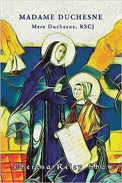
 |
Shaw recounts the true story of Rose Philippine Duchesne, a religious sister known for her devotion to children and the poor. Born in Grenoble, France, in 1769, Philippine consecrated herself to God during her first communion at the age of twelve. Six years later, she petitioned her father to enter a monastic life, and eventually, worn down by her persistence, he relented.
When the revolutionary government effectively banned the expression of Christianity in France, Philippine attempted to continue living out her faith by visiting the sick and educating street urchins. She soon realized she had a passion for teaching the faith to the young, and in 1817, she begged to be sent to Illinois for the spread of Catholicism in the Mississippi River Valley. The second half of the book describes her journey across the sea to St. Charles, Missouri, where she assisted in building one of the first free schools in America, and from there to Florissant, where she struggled through long winters and terrible flooding.
This retelling of Philippine’s life has much to recommend it, such as the emphasis placed on the importance of education, Philippine’s commitment to a life of humble service, and the poignancy of those dark moments of loneliness and despair that crowded her final days. Her willingness to shun worldly positions in favor of scrubbing floors and tending swine is a model of the kind of self-giving generosity that the Bible encourages. Readers who feel that their own lives have been marked by failure and disappointment may be pleased to learn that Philippine often felt the same way. For those who are unfamiliar with her life, this is an inspiring look at a remarkable woman.